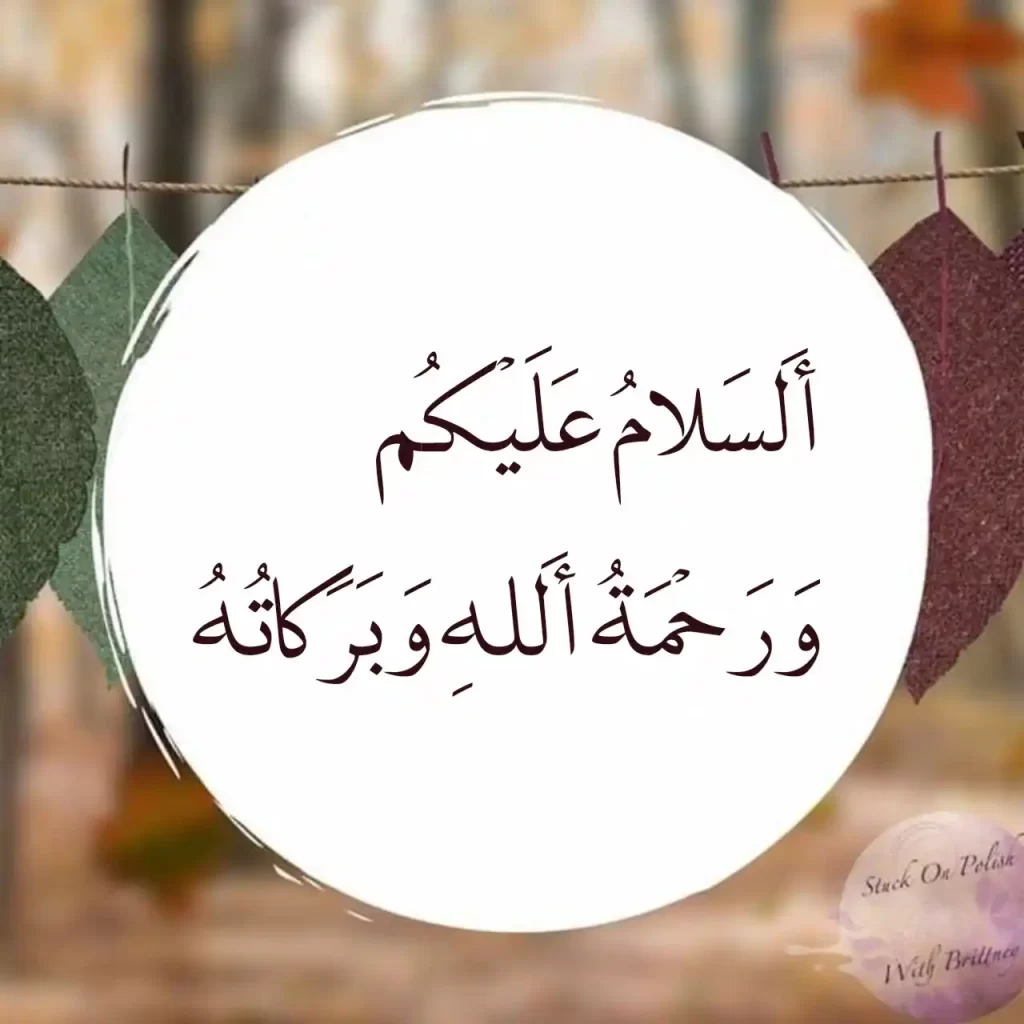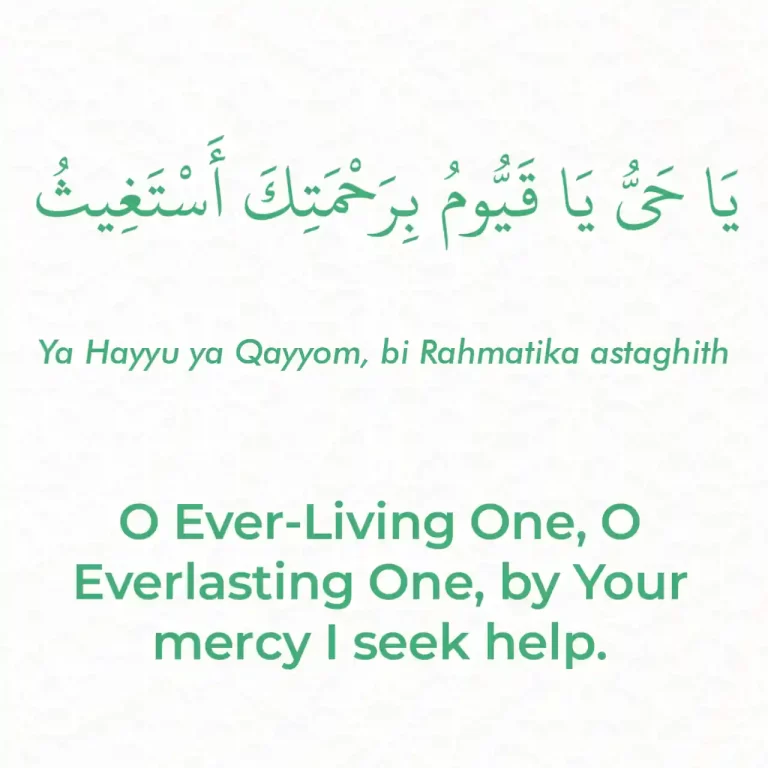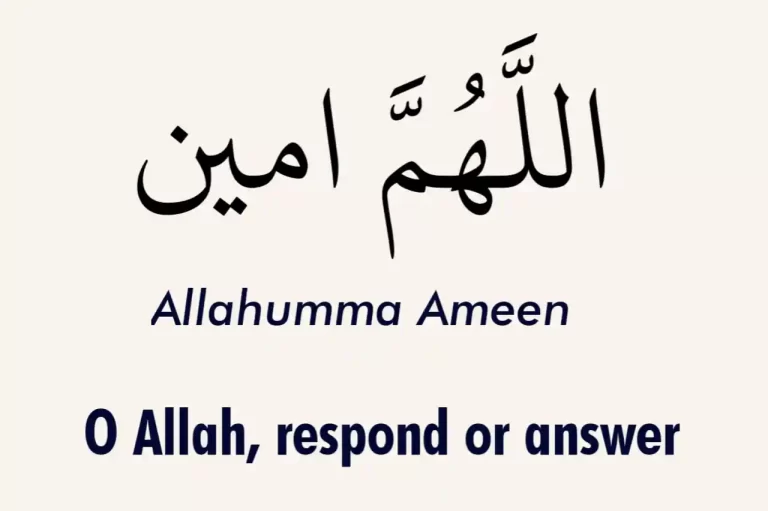Assalamualaikum Warahmatullahi Wabarakatuh in Arabic, Meaning and Reply
Assalamualaikum warahmatullahi wabarakatuh is a wording mentioned in the Quran and Sunnah for giving greeting.
Advertisements
Giving and returning the greeting is undoubtedly one of the acts of worship encouraged by the Prophet (blessings and peace of Allah be upon him) and enjoined by him.
Let’s see the meaning and of assalamualaikum warahmatullahi.
Assalamualaikum Warahmatullahi Wabarakatuh in Arabic Text
How do you write assalamu alaikum warahmatulla wabarakatuh in Arabic? Here is how you can write Assalamualaikum warahmatullahi wabarakatuh in Arabic Text.
اَلسَلامُ عَلَيْكُم وَرَحْمَةُ اَللهِ وَبَرَكاتُهُ
Advertisements
English Meaning:
Assalamualaikum Warahmatullahi Wabarakatuh Meaning in English
Assalamualaikum Warahmatullah Wabarakatuh Means Peace be upon you and Allah’s mercy and blessings. The meaning of salaam (literally, peace) is harmlessness, safety and protection from evil and from faults.

Assalamualaikum in Arabic Text Copy and Paste
The short phrase Assalamualaikum in Arabic with the Diacritical is:
اَلسَلامُ عَلَيْكُم
Advertisements
Assalamualaikum in English
Assalamualaikum in English means in “Peace be upon you“.
Assalamualaikum Reply
An acceptable reply to someone who says Assalamualaikum is wa alaikum assalam (in Arabic وعليكم السلام). You can reply even better.
The name al-Salaam is a Name of Allaah, may He be exalted, so the meaning of the greeting of salaam which is required among Muslims is, May the blessing of His Name descend upon you.
Advertisements
The usage of the preposition ala in alaykum (upon you) indicates that the greeting is inclusive.

What Is The Proper Response/ Reply to Assalamu Alaikum?
The Proper Response or reply to Assalamu Alaikum is wa alaikumussalam. Ibn Katheer (may Allah have mercy on him) said:
If a Muslim greets you with salaam, then return the greeting with something better than he said, or at least return the greeting in a similar manner. Adding more is recommended, and returning a similar greeting is obligatory.
- Thus if someone says Assalamu Alaikum, you should reply to him and say wa alaikumussalam or wa alaikumussalam warahmatullah
- If someone says Assalamu Alaikum Warahmatullahi, your respond should be wa alaikumussalam warahmatullah or wa alaikumussalam warahmatullah Wabarakatuh and
- If someone says Assalamu Alaikum Warahmatullahi Wabarakatuh, you should respond and say wa alaikumussalam warahmatullah Wabarakatuh
Rewards And Benefits Of Saying Assalamualaikum Warahmatullahi Wabarakatuh
Ibn al-Qayyim said:
Allaah, the Sovereign, the Most Holy, the Peace, prescribed that the greeting among the people of Islam should be alsalaamu alaykum, which is better than all the greetings of other nations, which include impossible ideas or lies, such as saying, May you live for a thousand years, or things that are not accurate, such as Anim sabaahan (Good morning), or actions that are not right, such as prostrating in greeting.
Thus the greeting of salaam is better than all of these, because it has the meaning of safety which is life, without which nothing else can be achieved.
So this takes precedence over all other aims or objectives.
A person has two main aims in life: to keep himself safe from evil, and to get something good. Keeping safe from evil takes precedence over getting something good.
The Prophet (peace and blessings of Allaah be upon him) made spreading salaam a part of faith.
It narrated from Abdullahi ibn Umar that a man asked the Messenger of Allah (peace and blessings of Allaah be upon him): What is the best thing in Islam?
He said: Feeding others and giving the greeting of salaam to those whom you know and those whom you do not know.
Al-Bukhaari (12, 28 and 6236), and Muslim (39)
Ibn Rajab said:
The hadeeth makes the connection between feeding others and spreading salaam because this combines good actions in both word and deed, which is perfect good treatment (ihsaan).
Indeed, this is the best thing that you can do in Islam after the obligatory duties.
Al-Sanoosi said:
What is meant by salaam is the greeting between people, which sows seeds of love and friendship in their hearts, as does giving food.
There may be some weakness in the heart of one of them, which is dispelled when he is greeted, or there may be some hostility, which is turned to friendship by the greeting.
Al-Qaadi said:
Here the Prophet (peace and blessings of Allaah be upon him) was urging the believers to soften their hearts.
The best Islamic attitude is to love one another and greet one another, and this is achieved by words and deeds.
The Prophet (peace and blessings of Allaah be upon him) urged the Muslims to foster love between one another by exchanging gifts and food, and by spreading salaam, and he forbade the opposite, namely forsaking one another, turning away from one another, spying on one another, seeking out information about one another, stirring up trouble and being two faced.
Love is one of the duties of Islam and one of the pillars of the Islamic system.
One should give salaams to those whom one knows and those whom one does not know, out of sincerity towards Allaah; one should not try to impress other people by giving salaams only to those whom one knows and no-one else.
This also entails an attitude of humility and spreading the symbols of this ummah through the word of salaam.
Thus the Prophet (peace and blessings of Allaah be upon him) explained that this salaam spreads love and brotherhood.
Abu Hurayrah (may Allaah be pleased with him) narrated that the Messenger of Allaah (peace and blessings of Allaah be upon him) said:
You will not enter Paradise until you believe, and you will not believe until you love one another.
Shall I not tell you about something which, if you do it, you will love one another? Spread salaam amongst yourselves.

Al-Qaadi Ayaad said:
This is urging us to spread salaam, as mentioned above, among those whom we know and those whom we do not know.
Salaam is the first level of righteousness and the first quality of brotherhood, and it is the key to creating love.
By spreading salaam the Muslims love for one another grows stronger and they demonstrate their distinctive symbols and spread a feeling of security amongst themselves. This is the meaning of Islam.
The Prophet (peace and blessings of Allaah be upon him) also explained the reward earned by the one who says salaam, as was reported by Bukhari and al-Nisaai.
They reported from Abu Hurayrah (may Allaah be pleased with him) that a man passed by the Messenger of Allaah (peace and blessings of Allaah be upon him) whilst he was sitting with some others, and said Salaam alaykum (peace be upon you).
The Prophet (peace and blessings of Allaah be upon him) said, [He will have] ten hasanaat (rewards). Another man passed by and said Salaam alaykum wa rahmat-Allaah (peace be upon you and the mercy of Allaah).
The Prophet (peace and blessings of Allaah be upon him) said, [He will have] twenty hasanaat. Another man passed by and said Salaam alaykum wa rahmat-Allaahi wa barakaatuhu (peace be upon you and the mercy of Allaah and His blessings). The Prophet (peace and blessings of Allaah be upon him) said, [He will have] thirty hasanaat.
The Prophet (peace and blessings of Allaah be upon him) commanded us to return salaams, and made it a right and a duty.
Abu Hurayrah (may Allaah be pleased with him) reported that the Prophet (peace and blessings of Allaah be upon him) said: The Muslim has five rights over his fellow-Muslim:
- He should return his salaams,
- Visit him when he is sick,
- Attend his funeral,
- Accept his invitation, and
- Pray for mercy for him [say Yarhamuk Allaah] when he sneezes.

It is clear that it is obligatory to return salaams, because by doing so a Muslim is giving you safety and you have to give him safety in return.
It is as if he is saying to you, I am giving you safety and security, so you have to give him the same, so that he does not get suspicious or think that the one to whom he has given salaam is betraying him or ignoring him.
The Prophet (peace and blessings of Allaah be upon him) told us that if Muslims are ignoring or forsaking one another, this will be put to an end when one of them gives salaam.
Al-Bukhaari (6233) reported that Abu Ayyoob (may Allaah be pleased with him) said:
The Messenger of Allaah (peace and blessings of Allaah be upon him) said:
It is not permissible for a Muslim to forsake his brother for more than three days, each of them turning away from the other if they meet. The better of them is the first one to say salaam.
It is mustahabb (recommended) for the Muslim to return the greeting of salaam in a manner similar to that which was said to him, or better than it.
Islamic teaching recommends that the recipient of the greeting should return the greeting in a manner similar to what was said to him, or better than it.
Allah (may He be exalted) says (interpretation of the meaning):
“And when you are greeted with a greeting, greet [in return] with one better than it or [at least] return it [in a like manner]. Indeed, Allah is ever, over all things, an Accountant”
[an-Nisaa’ 4:86].

Few Etiquettes of Salam
- The one who comes greets the Muslims that are present.
- The one who is riding greets the one who is walking.
- The one who is walking greets the one who is sitting.
- The smaller group greets the bigger group.
- The young greet the elder.
- And it is preferable for him to choose the most complete and best of them so that it will increase his reward.

Conclusion
Allah prescribed the salaam for Adam (peace be upon him) and his descendants until the Hour begins.
In fact the greeting of the believers will continue to be salaam even after they enter Paradise.
It was narrated by Abu Hurayrah (may Allah be pleased with him) from the Prophet SAW, that when Allah, may He be exalted, created Adam, He said to him:
Go and greet that group, who were a group of the angels who were sitting (nearby), and listen to their response, for it will be your greeting and the greeting of your descendants.
So he went to them and said Assalaamu alaykum (peace be upon you), and they said Assalaamu alayka warahmatulAllah (peace be upon you and the blessing of Allah), so they added (the words) wa rahmat-Allah.
So salaam is the greeting of Adam and his descendants.
Al-Bukhaari narrated in al-Adab al-Mufrad (989) that Anas (may Allah be pleased with him) said:
The Messenger of Allah (blessings and peace of Allah be upon him) said: Assalaam is one of the names of Allah, may He be exalted, and Allah has ordained it on earth, so spread (the greeting of) salaam amongst yourselves.
All people have the custom of greeting one another, and every group has its own distinctive greeting that distinguishes them from other people.
When Islam came, Allaah prescribed that the manner of greeting among Muslims should be Alsalaamu alaykum, and that this greeting should only be used among Muslims and not for other nations.
Advertisements








2 Comments